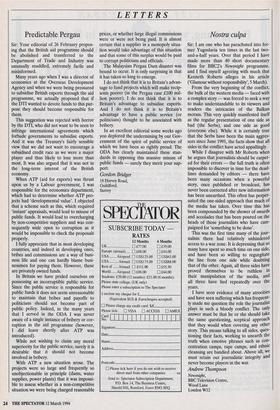Nostra culpa
Sir: I am one who has parachuted into for- mer Yugoslavia ten times in the last two- and-a-half years. Over that period I have made more than 40 short documentary films for BBC2's Newsnight programme, and I find myself agreeing with much that Kenneth Roberts alleges in his article (`Glamour without responsibility', 5 March).
From the very beginning of the conflict, the bulk of the western media ŌĆö faced with a complex story ŌĆö was forced to seek a way to make understandable to its viewers and readers the intricacies of the Balkan morass. This very quickly manifested itself as the regular presentation of one side as bad (the Serbs), and one side as good (everyone else). While it is certainly true that the Serbs have been the main aggres- sors since June 1991, the facts show that all sides in the conflict have acted appallingly.
While I disagree with Mr Roberts when he argues that journalists should be carpet- ed for their errors ŌĆö the full truth is often impossible to discover in time for the dead- lines demanded by editors ŌĆö there have been many occasions when a powerful story, once published or broadcast, has never been corrected after new information has been unearthed. This often has perpet- uated the one-sided approach that much of the media has taken. Over time this has been compounded by the shower of awards and accolades that has been poured on the heads of those journalists who have cam- paigned for 'something to be done'.
This was the first time many of the jour- nalists there had relatively unhindered access to a war zone. It is depressing that so many have spent so much time on one side, and have been so willing to regurgitate the line from one side while doubting that of the other. Again, all three sides have proved themselves to be ruthless U' their manipulation of the media, and all three have lied repeatedly over the years. I have seen evidence of many atrocities and have seen suffering which has frequent- ly made me question the role the journalist plays in such a bloody conflict. The only answer must be that he or she should take the same questioning, sceptical approach that they would when covering any other story. This means talking to all sides, ques- tioning their facts, working to unearth the truth when emotive phrases such as con- centration camps, rape camps, and ethnic cleansing are bandied about. Above all, we must retain our journalistic integrity and never become players in the war.
Andrew Thompson
Newsnight, BBC Television Centre, Wood Lane London W12


















































 Previous page
Previous page